
AG Molekulare Tumorimmunologie (Paschen)
Wissenschaft/Forschung
Die experimentellen Labore der Klinik für Dermatologie befassen sich primär mit der Diagnose und Therapie von Hauttumoren und übertragen ihre Forschungsergebnisse direkt in die Klinik. Schwerpunkt ist das maligne Melanom (der schwarze Hautkrebs), ein bösartiger Tumor, der von Pigmentzellen der Haut ausgeht. Die Wissenschaftler der Abteilung befassen sich mit translationalen Fragestellungen zu verschiedenen Aspekten der Dermatoonkologie, insbesondere der Tumorimmunologie und der Blut- und Lymphgefäßversorgung (Vaskuläre Onkologie). Im Rahmen der Molekularen Diagnostik wird für jeden Tumor ein Mutationsprofil erstellt. Da das genetische Profil eines Tumors mit der Therapieeffizienz assoziiert ist, kann auf diese Weise eine für jeden Patienten optimierte Behandlung angeboten werden. Die im Labor etablierte umfangreiche Biomaterialbank ermöglicht es außerdem, Faktoren zu identifizieren, welche die Prognose und den Krankheitsverlauf beeinflussen.
Arbeitsgruppe “Molekulare Tumorimmunologie“
Das Immunsystem ist in der Lage, zwischen malignen und normalen Zellen zu unterscheiden: Cytotoxische Effektorzellen des angeborenen und des adaptiven Immunsystems (z.B. NK Zellen, CD8+ T Zellen) können autologe Tumorzellen eliminieren, während sie gesunde Zellen ignorieren. Basierend auf dieser Kenntnis verfolgen Wissenschaftler und Mediziner verschiedene immuntherapeutische Strategien, um in Patienten die Effektoren gegen den Tumor zu aktivieren. Da Tumorzellen aber genetisch instabil sind, können Varianten auswachsen, die sich der Immunerkennung durch verschiedene Mechanismen entziehen (“Immune Escape“). Wir untersuchen die molekularen Grundlagen des “Immune Escape“, die humane Melanomzellen gegen eine NK und T Zellattacke schützen. Erst die Kenntnis dieser Mechanismen schafft die Voraussetzungen für eine Optimierung der immuntherapeutischen Behandlung von Tumorpatienten. Weitere Informationen sind nur in englischer Sprache erhältlich.

Prof. Dr. rer. nat.
Annette Paschen
Group Leader
Background
Treatment of advanced metastatic melanoma has for decades been a story of limited clinical success. This dramatically changed with the recent clinical implementation of two types of therapies: immunotherapy based on immunomodulating antibodies, termed immune checkpoint blocking therapy (ICBT), and targeted therapies employing inhibitors of the oncogenic MAPK signaling pathway. Those treatments can induce remarkable clinical responses in a subgroup of patients, but still the majority of patients is resistant to therapy or develops resistance after initial therapy response. There is accumulating evidence for a fundamental role of adaptive and innate cytotoxic lymphocytes, tumor antigen-specific T cells and natural killer (NK) cells, respectively, in tumor cell elimination not only in the course of immunotherapy but also targeted therapy. Both, adaptive and innate lymphocytes can recognize melanoma cells as “abnormal self” but by different mechanisms. Within the research group “Molecular Tumor Immunology” we study the interaction of melanoma cells with tumor antigen-specific CD4+ / CD8+ T cells and NK cells. In particular we focus on resistance mechanisms allowing tumor cells to escape either from recognition or killing by T cells and NK cells (immune escape). Several studies, including our own, suggest that melanoma immune escape sets a barrier to successful ICBT and targeted therapy indicating the need to unravel the underlying molecular resistance mechanisms for improvement of treatment regimens.
T cell recognition of melanoma cells: Cytotoxic CD8+ T cells respond to the aberrant repertoire of antigen peptides presented by HLA class I molecules on melanoma cells. Those peptides originate from the degradation of endogenous tumor proteins. The protein repertoire of tumor cells is quantitatively and qualitatively different from that of normal cells. The distinct pool of presented tumor antigen peptides allows T cells to distinguish tumor cells from normal cells. Upon binding with their T cell receptors to specific HLA class I-antigen peptide complexes, CD8+ T cells become activated and initiate tumor cell killing, e.g. by release of cytolytic granules. Additionally, the T cell-secreted cytokines IFNg and TNFa contribute to the efficacy of anti-tumor responses by inducing cell cycle arrest and apoptosis of surrounding cells. There is growing interest also in the anti-tumor activity of CD4+ T cells, recognizing tumor antigens presented by HLA class II surface molecules. Subpopulations of melanoma cells show constitutive HLA class II expression, thereby becoming direct targets of tumor antigen-specific CD4+ T cells.
NK cell recognition of melanoma cells: Activity of NK cells against tumor cells is tightly regulated by a balance of inhibitory and activating signals. Binding to HLA class I surface molecules dampens NK cells activity. Thus NK cells become activated by melanoma cells with aberrant HLA class I expression. However, loss of inhibitory signals is not sufficient to trigger NK cell activity. Additionally, target cells must express activating surface ligands of stimulatory NK receptors like NKG2D or DNAM-1.
Overall aim – Unravel T cell and NK cell resistance of melanoma cells
Melanoma cells are genetically unstable und appear in different cell phenotypes (plasticity). This leads to a high degree of genetic and epigenetic tumor cell heterogeneity within and between distinct patient metastases. In this regard, immune cell activity generates a selective pressure favoring the outgrowth of tumor variants that escape from recognition or killing by T cells and NK cells (immune escape). We aim to understand immune escape mechanisms by addressing the following major topics:
- Escape of melanoma cells from CD4+ and CD8+ T cell recognition by HLA alterations
- Melanoma resistance to interferons
- Oncogenic signaling and its impact of melanoma cells resistance towards NK and T cells
Group Leader

Prof. Dr. rer. nat.
Annette Paschen
Group Leader
Lab manager

Antje Sucker
Senior Technichian
Postdoctoral Scientists
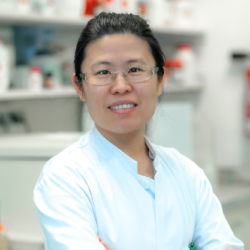
Dr. rer. nat.
Fang Zhao
Postdoc

Dr. rer. nat.
Philine Steinbach
Postdoc

Dr. med.
Johanna Seier
Assistenzärztin
Technical Assistants

Simon Kai Brille
Lab Technician
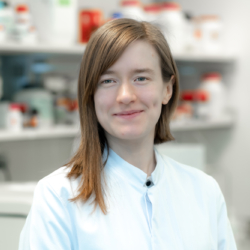
Julia Kretz
Lab Technician

Elisa Krosta
Lab Technician
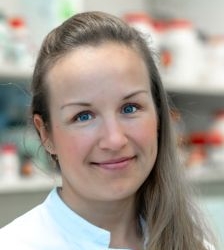
Sabrina Kwapik
Lab Technician

Marion Laudage
Lab Technician
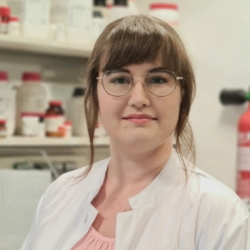
Eileen Majewski
Lab Technician

Inga Möller
Lab Technician
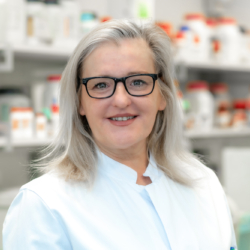
Birgit Real
Lab Technician

Mingxia Song
Lab Technician

Nadine Stadtler
Lab Technician
Students

Alicia Brüggemann
PhD Student
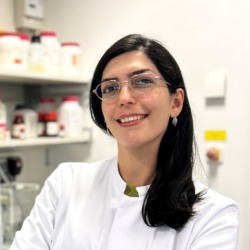
Fatemeh Ghorbani
Phd student

Simone Stupia
PhD Student